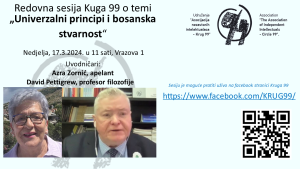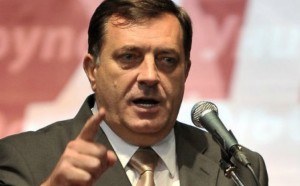THE ROAD TO A MODERN BOSNIA AND HERZEGOVINA

| Sarajevo, 23 November 2022-24 THE ROAD FROM ETHNIC TO CIVIC GOVERNANCE, THE ROAD TO A MODERN BOSNIA AND HERZEGOVINA The civic governance of Bosnia and Herzegovina is a subject that has long evoked controversy in and around the Bosnian political scene. The idea has emerged of “reconciling ethnic and civic” as the only path to establishing individual rights. But this is no more than a trap which would preserve the existing situation and would halt the hundred years or so of Bosnian aspirations to join the community of modern civic societies and democratic states. Modern functional Western democratic societies and states require good will in such political debate. But for the past nearly 30 years the unsuccessful example of Bosnia clearly shows that an ethnic political structure gives rise to ethnic nationalism, separatism, an unstable state and a conflicted society. In one model, advanced by some international observers, “reconciliation between ethnic and civic” is possible only within a particular ethnic group, but not at all among members of different groups, or among those who do not want to be politically categorized into ethnic political groups regardless of their personal ethnic, religious, racial or any other type of identity. Instead of an inclusive multiethnic society, there would continue to exist a conflicted, ethnically divided society, while the sovereignty of the state would remain in the hands of self-proclaimed ethnic leaders and the interests of neighboring states. The doctrine being urged upon Bosnia – “reconciliation of ethnic and civic” – stands in contrast to the structure of a modern state, as well as individual civic political rights and fundamental freedoms, which should be the imperative for any modern society and state. Proposals have been made for a “fourth pillar” (a fourth Member of the Presidency of Bosnia and Herzegovina). In this way, the “Others” would not be able to exercise their rights as individuals or citizens, but rather as members of a virtual new “ethnic” group. This is one of the traps that would destroy the future of a modern civic society and democratic state, as well as the equality of every individual before the law. With recent changes in the Electoral Law, collectives have many more rights while the rights and equality of individuals to freely elect and to be elected are negated. Electoral possibilities are reduced to ethnic identification and place of residence. In the beginning, it seemed that the decisions of High Representative Christian Schmidt – concerning deblocking elections, state property, deblocking the selection of Constitutional Court judges and timelines for the formation of a Federation government – were a move in the direction of making Bosnia functional and democratic. However, these recent decisions actually go in the opposite direction and represent a step backwards toward cementing ethnic segregation and civic inequality. The decisions of the High Representative toward “reconciling civic and ethnic” only distance Bosnia even farther from European values and necessary integration. The key question for Bosnian public opinion is: Why is the hundred-year-old national aspiration for a modern European Bosnia and Herzegovina being halted, this path from ethnic to civic political governance, thus hindering the democratic future of Bosnia and Herzegovina? And, not only by local ethnic, nationalist and separatist elites, but also by a part of the international community, whose own states and societies were a model and inspiration for the Bosnian democratic transition? It appears that the imperial ideology of the “Russian world” has its proponents also among those who today represent the most important supporters of Ukraine’s defense against Putin’s aggression. It is unacceptable that collateral damage from the Russian model of imperialism or any other ethnic nationalism should be a policy of concessions to aggressors and of an undemocratic political structure in Bosnia today and maybe in Ukraine tomorrow. For Bosnian citizens already accustomed to all types of experimentation, the afore-mentioned doctrine and policy will not, by historic necessity, yield sustainable results, nor will they destroy the will of the majority of the people to achieve a free society and a democratic state. In fact, Bosnia’s transition to a modern West European political structure has continued for far too long. ** Summary of the Session of 13 November by Milan Dunovic, Vice President of the Federation of Bosnia and Herzegovina Adil Kulenović, President |
| Association of Independent Intellectuals – Circle 99 (Bosnian: Krug 99), a leading Bosnian think-tank, was established in Sarajevo in 1993, in the midst of the Bosnian war (1992-1995), while the capital was under siege. Circle 99 provides a platform to bring together intellectuals of various professional and ethnic identities; university professors, members of the Academy of Sciences and Arts of Bosnia and Herzegovina, artists, journalists, entrepreneurs, diplomats, and other prominent figures from Bosnia and from abroad. Multidisciplinary discussions and initiatives are held each Sunday throughout the academic year, in the form of regular sessions about politics, science, education, culture, economy, and other societal issues. The overall goal is to sensitize the public towards a democratic transformation, achieving and maintaining peace, and integration of modern Bosnia into the community of countries fostering liberal democracy. Circle 99 has been declared an organization of special significance for the city of Sarajevo. |







